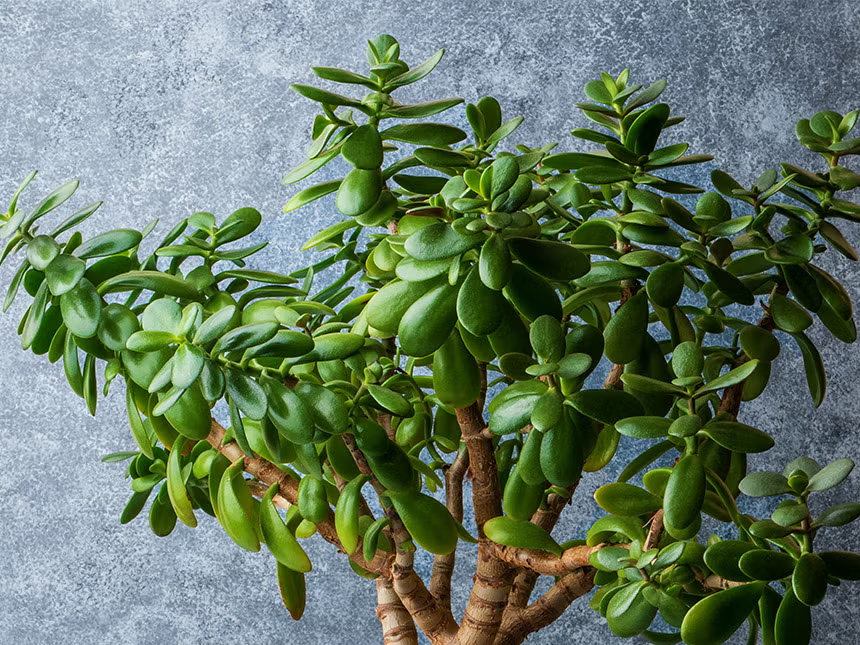The jade plant (Crassula ovata), or the money tree or lucky plant, is one of the most popular houseplants due to its beautiful, thick, glossy leaves and ease of care. Native to South Africa and Mozambique, jade plants have become a household staple in many cultures. These succulents are not only a stunning addition to any home or office but are also believed to have the benefits of keeping a jade plant for the people who keep them.
From improving air quality to symbolizing good fortune, jade plants offer much more than just aesthetic appeal. In this article, we’ll explore some significant benefits of keeping a jade plant at home.
9 Benefits of Keeping A Jade Plant At Home

1. Improved Air Quality
One of the primary benefits of keeping a jade plant for people is their ability to purify the air. Jade plants are no exception. Like other succulents, jade plants help improve indoor air quality by absorbing carbon dioxide and releasing oxygen.
They also act as natural air filters, trapping dust particles and pollutants such as formaldehyde and benzene. By improving the air quality, jade plants create a healthier environment in your home or office, promoting better respiratory health and reducing symptoms of allergies and asthma.
The process by which jade plants purify the air is known as photosynthesis—where they take in sunlight, water, and carbon dioxide, releasing oxygen as a byproduct. The presence of these plants indoors helps maintain a steady flow of oxygen in your living space, improving overall air circulation. For homes or offices with limited ventilation, jade plants can be a simple and effective way to improve air quality.
2. Symbol of Good Luck and Prosperity
In various cultures, the jade plant is considered a symbol of good luck, prosperity, and wealth. This belief is particularly prevalent in Feng Shui, the ancient Chinese practice of arranging your living space to maximize harmony and energy flow.
It is common in Feng Shui to place a jade plant near the entrance of a home or office to invite prosperity. The jade plant’s symbolic value makes it an attractive and meaningful gift for loved ones, especially for celebrations such as housewarmings, weddings, and business openings.
3. Stress Reduction and Improved Mental Well-Being
One of the advantages of having a jade plant is that keeping plants in the home has been scientifically linked to reduced stress levels, improved mood, and enhanced cognitive function. The presence of the jade plant, like other greenery, creates a calming and soothing environment. Studies have shown that interacting with plants can reduce feelings of anxiety, improve focus, and promote a sense of tranquility.
Spending time with plants, whether through watering or simply observing them, can have a meditative effect. The green color of the jade plant is particularly effective in inducing relaxation and promoting positive mental health. Having plants in your home may help combat the negative effects of stress by improving your overall well-being and fostering a more balanced emotional state.
4. Low Maintenance and Easy to Care For
For those with a busy lifestyle or minimal gardening experience, the jade plant is an ideal choice due to its low-maintenance nature. Jade plants are succulents, which means they store water in their leaves, making them highly drought-resistant. This allows them to thrive with minimal watering and can go for weeks without requiring attention.
The jade plant’s needs are simple: it requires a well-draining pot, indirect sunlight, and occasional watering. Overwatering can lead to root rot, so it’s essential to let the soil dry out completely between waterings. The jade plant’s ability to adapt to a range of conditions makes it an excellent choice for beginners and those with limited time to care for houseplants.
5. Longevity and Resilience
Jade plants and the benefits of keeping a Jade plants are known for their longevity and resilience. Some jade plants can live for decades, with the oldest specimens surviving for up to 100 years. This is largely due to their ability to adapt to a wide range of environments and their resistance to pests and diseases.
Their resilience makes them a great option for people who may forget to water their plants regularly or those with less-than-ideal growing conditions.
6. Improved Focus and Productivity
Numerous studies have shown that the presence of plants in a workspace can improve concentration and productivity. The jade plant, with its simple and clean appearance, can enhance focus in both home offices and professional environments. The calming effect of greenery promotes mental clarity and reduces distractions, allowing you to stay focused on the task at hand.
Having plants around your workspace can also improve creativity and problem-solving skills. The jade plant, with its bright, glossy leaves and pleasing appearance, can help boost your mood and mental clarity, leading to more efficient and productive workdays.
7. Natural Humidifier
The advantages of having a jade plant can also help maintain optimal humidity levels in your home. Like many other plants, the jade plant absorbs water through its roots and then releases moisture into the air through a process called transpiration. This naturally increases the humidity in your home, which can be beneficial in dry environments or during winter months when indoor air tends to be drier.
Maintaining proper humidity levels can help prevent dry skin, respiratory issues, and discomfort from dry air. The jade plant’s ability to act as a natural humidifier is especially beneficial in households with children or individuals with sensitive skin or respiratory conditions.
8. Pest Control
While jade plants are generally resistant to pests, they do have some natural pest-repelling properties. The thick, fleshy leaves make it harder for insects to infiltrate, and their low water requirements mean they’re less likely to attract pests like gnats or mosquitoes. Additionally, the presence of jade plants can help deter other common houseplant pests such as aphids and spider mites.
In cases where pests do appear, the jade plant is easy to treat. A simple wipe-down with soapy water or neem oil is often enough to keep unwanted insects at bay, making it a low-maintenance and pest-resistant option for indoor gardening.
9. Aesthetic Appeal
Beyond its symbolic and practical benefits, the jade plant adds a unique aesthetic element to any home or office. Its glossy, dark green leaves and attractive shape make it an elegant and visually pleasing plant. Their rounded leaves and sculptural appearance make them suitable for both modern and traditional interiors.
The jade plant’s aesthetic versatility allows it to fit in any room, from living rooms to kitchens to bedrooms. Moreover, it pairs well with other houseplants, making it a perfect addition to an indoor garden or succulent collection.
Wrapping Up
Any house or business would greatly benefit from the flexible and versatile addition that the jade plant offers. This hardy and low-maintenance succulent is not just visually appealing, but it also provides a wide range of practical benefits that make it a valuable asset to any space. The jade plant is well-known for its air-purifying properties, making it an excellent choice for improving the overall air quality in both homes and offices.
By absorbing carbon dioxide and releasing oxygen, it naturally helps create a healthier indoor environment, which can be especially beneficial in spaces with limited ventilation. Its symbolism of wealth and prosperity is another reason why it’s such a popular plant. According to the ancient Chinese practice of Feng Shui, the jade plant is believed to bring good fortune and financial stability, making it a thoughtful addition to business environments or the home.
Studies have shown that indoor plants, such as the jade plant, contribute to lower levels of anxiety and help create a calming atmosphere. The presence of greenery has a soothing effect on the mind, which can help improve focus, productivity, and overall mood. Whether you’re working from home or simply seeking a peaceful environment to unwind, the jade plant’s calming energy can make a noticeable difference in your daily life.
In addition to the numerous benefits of keeping a jade plant, it is exceptionally durable and adaptable, thriving in various environments with minimal care. Its long lifespan and resilience are a true reflection of growth, endurance, and good fortune, making it not only a practical plant but also a meaningful one that adds a touch of positivity to any space.
FAQ
Q: What is the jade plant used for?
A: By eliminating dangerous pollutants from the interior air, it serves as a natural air filter. A jade plant is said to draw riches and success while encouraging the flow of good energy, according to Feng Shui beliefs. This plant is ideal for bedrooms since it produces oxygen at night and absorbs CO₂.
Q: Does a jade plant purify the air?
A: Although they are not as effective as certain other plants that have been specially researched for their ability to filter the air, jade plants may help with indoor air filtration. Generally speaking, plants may enhance indoor air quality by releasing oxygen and absorbing certain contaminants.
Q: For what duration can a jade plant survive without watering?
A: For established plants in a cool, humid area, they can often last up to a month without water before becoming noticeably thin. Your stem may not be robust enough if it is getting limp.












Dead indited content material, Really enjoyed looking at.
Thanks! I’m glad you enjoyed it!
Keep functioning ,great job!
Thanks a ton! I really appreciate the encouragement — it keeps me motivated. I’ll definitely keep at it!
Hello my friend! I wish to say that this article is amazing, great written and come with approximately all significant infos. I’d like to peer extra posts like this .
Thank you so much for your kind words! I’m really glad you enjoyed the article. I’ll definitely keep sharing more valuable and informative posts—stay tuned for more!